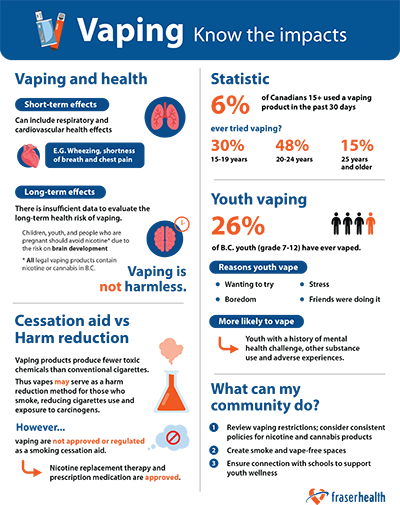
Nicotine-use with either tobacco or vapour products is a health concern
Commercial tobacco use remains the leading cause of disease, death, and disability in BC. It contains nicotine, a highly addictive substance, and over 7,000 chemicals, at least 69 known to carcinogens. Smoking and smokeless tobacco (snus, snuff, chew) is the cause of many diseases and conditions, including lung disease, heart disease, respiratory illnesses and several types of cancer.
Know the impacts of tobacco on your health.
Many people consider vapour products a safe alternative to tobacco; however, vaping increases exposure to chemicals that can lead to respiratory and cardiovascular health effects. Further to this, all vapour products in the B.C. retail market contain nicotine, which is a particular concern among children, youth and women who are pregnant due to its negative effect on the developing brain. Vaping has helped some people quit smoking though it is not a proven smoking cessation method.
How can I quit smoking?
Quitting smoking is hard for most people regardless of age but it is never too late to quit.
Chances of success in quitting smoking doubles with planning, a good support network, and for some people nicotine replacement therapy or smoking cessation prescription medication.
QuitNow BC is a free Government of British Columbia program to help B.C. residents quit smoking and remain smoke-free.
They offer a variety of quit service modalities:
- Chat and Phone Support is one-to-one support offered by Quit Coaches by telephone (1-877-455-2233) or 'Live' online chat on the QuitNow website
- Web Support assists in creating a personalized Quit Plan on the QuitNow website
- Text Support is provided by texting "QUITNOW" to 654321
- Group Support by Phone offers practical tips for quitting from Quit Coaches and from others who are on the same journey; call 1-877-455-2233 to register
- QuitNow also provide supports to quit vaping nicotine products; call 1-877-455-2233 or connect via Live Chat for this service
Quit smoking medications have helped many people quit. Nicotine Replacement Therapy (NRT), an over the counter medication, used in combination (nicotine patch plus gum, lozenge, spray or inhaler) and appropriate dosage reduces nicotine cravings and increases success in quitting. Stop smoking prescription medications Varenicline (Champix) or Bupropion (Zyban) are pills that do not contain nicotine. They are obtained by prescription from your health care provider. Quitting Smoking: Should I Use Medicine? is a HealthLinkBC webpage that describes the various stop smoking medications and helps you to understand the medication choices in order to talk to your doctor about them.
The BC Smoking Cessation Program helps people stop using tobacco products by assisting them with the cost of smoking cessation medications. BC residents can obtain 12 weeks of free NRT by seeing a pharmacist and signing a declaration form. The program covers the cost of the stop smoking prescription medication for those registered on a PharmaCare Plan.
Smoking Cessation Clinics offer evidence-based treatment to those interested in addressing their tobacco use. There are two clinics in the Fraser Health region and one clinic in Vancouver Coastal Health that offer smoking cessation services to residents living in the Fraser Health region.
- Jim Pattison Outpatient Care and Surgery Centre Smoking Cessation Clinic is a free 12-week program with 3 group sessions and follow-up phone calls; call 604-582-4565 for more information (physician or nurse practitioner referral required)
- Ridge Meadows Hospital Smoking Cessation Clinic offers free group sessions; call 604-463-1820 for more information (self-referrals accepted)
Commercial versus traditional tobacco
Traditional tobacco has been used for hundreds of years by Indigenous Peoples across the Fraser Salish region and across Canada. The plant is considered sacred for its immense spiritual and healing properties and is regarded with great respect for these reasons.
It is important to remember that traditional tobacco, which is used in Indigenous prayers and ceremonies, is different from commercial tobacco, such as cigarettes and chewing tobacco. The latter is harmful to one's health, contains dangerous additives and damages the planet through its industrial production.
Additional information and resources
For more tobacco and vapour product information, please contact smoke-free@fraserhealth.ca.


